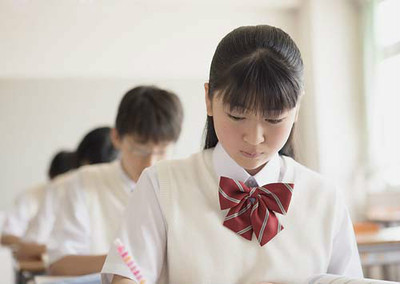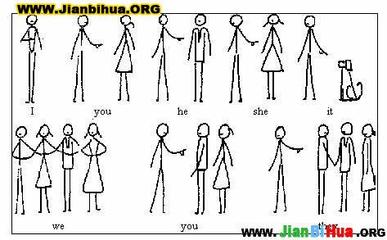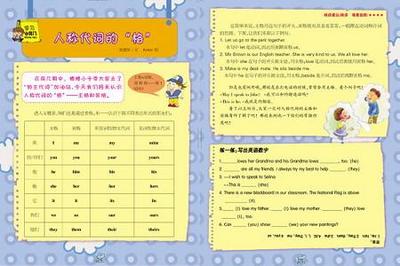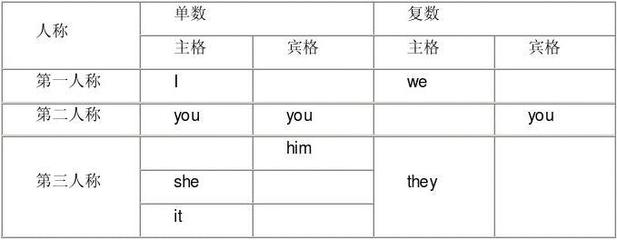代词
分类 | 用法 |
人称代词 ★不仅指人,也可指物 主格:I , we, you ,he, she, it,they, 宾格:me, us, you, him, her, it ,them | 1. 主格作主语,宾格作宾语 She is our teacher.(主格作主语) I often help him with his math.(宾格作宾语) ★口语中,人称代词宾格常用作表语 Who is there? It’s me.(宾格作表语) 2. 人称代词在句子中的顺序 单:第二人称+第三人称+第一人称 You +he/she + I You, he and I are in the same classroom. 复:第一人称+第二人称+第三人称 We +you +they We, you and they are all Chinese. 3.glasses,sunglasses,boots等复数形式的词 单独:动词用复数,对应代词they或them My trousers are over there and theyare dirty. 与量词一起:动词用单数,对应代词they或them If you find a pair of scissors in thedrawer, pass them to me. 4.as和than 之后的人称代词 as和than之后的人称代词,作主语用主格,作宾语用宾格;但在非正式语体中,或带有all,both时,通常用宾格。 She speaks English as well as me. (非正式) He is taller than us all. 5.it 用法: ①表示无生命、已提到过的事物 Whosecoat is this? It’s mine. ②性别不祥的幼儿或小动物 What a beautiful baby! Is it a boy? ③指“那个人” Who is it at the door?It’s the postman. ④无人称主语或宾语(天气、时间、距离等) It’s raining. It’s twenty miles from here to Shanghai. |
物主代词 形容词性物主代词:my , our, your, his , her, its ,their 名词性物主代词:mine, ours, yours, his , hers,its, theirs | ★1.形容词性物主放在名词前,不可单独使用。 This is her book. Your school is not very far. ★2.名词性物主代词=形容词性物主代词+名词,起名词作用,可单独使用 Ours (=Our country) is a great country. I haven’t taken my umbrella. May I shareyours(=your umbrella)? ★3.物主代词的固定搭配 of one’sown…on one’s own with one’sown …人自己的独自用某人自己的… Hold one’sbreath make one’sway in one’s way 屏住呼吸找到路前进妨碍某人,挡某人的路 To one’ssurprise/amazement…使某人吃惊的是… |
反身代词 myself, yourself , ,himself, itself yourselves,,themselves , ourselves | 1.★反身代词作同位语 The teacher himself willvisit Tom’s parents. 2.★反身代词作宾语 They do the work by themselves. 3.★表示独立完成某事,亲自做某事,为自己做了某事 call oneself …makeoneself … cookoneself… 把自己称为…为自己做了…为自己作了… 吃 buyoneself… findoneself… 给自己买了…给自己找了… He usually calls himself Old Jim. 4. ★反身代词的固定搭配 for oneselfby oneself tooneself teachoneself 亲自独自独用自学 hurtoneself bepleased with oneself 弄伤自己对自己感到高兴 can’t helponeselfhelponeself to… 忍不住,无法控制自己谁便吃,为自己取(食物等) |
指示代词 This, that, these ,those | ★离说话人近的用this, those;远的用that, those. You look in this box here, and I’ll look inthat box over there. I saw him this morning. He was very busy those days. |
疑问代词 Which, who, whom, whose, what | which 哪个 Which apple do you like? who/whom谁(主语/宾语) Who is the lady over there? whose 谁的 Whose book is this? what 什么(color, kind,size) What’s kind of housework do you usuallydo? |
不定代词 常见的不定代词:one , some, any, all, every, anther,other, many, much, few, little, neither, either 合成的不定代词: something, somebody, someone, anything, anybody, anyone, everything ,everybody, everyone nothing, nobody,none , no one | 1.some(thing/body/one)某(事/人/人) any(thing/body/one)任何(事/人/人) everything一切事every(body/one)每个(人/人) no(thing/body/)没什么/没有人 none没有人或没有东西 noone 没有人 ★只有none +(of),其他的合成不定代词不可以 ★合成的不定代词+else,表示另外的﹡﹡, 所有格:﹡﹡ else’s ★修饰复合不定代词的定语(形容词等)要放在它们的后面 somethingimportant ★2.不定代词的固定搭配 one :one anther相互 one byone 一个接一个 other: on the other side of在…的另一边 in other words 相反的路/ 方向 on the one hand ….on the other hand 一方面…另一方面 some: some day 某一天 for some time 经过若干时间 toth: on both side 双方,两边 all: all the time 总是 all kindsof 各种各样的 all new全新 allalong 一直,始终 allover 到处 all thesame 还是,仍是 (not) atall 无论如何(都不) every: every day 每天 every time 每次 every 3 weeks 每三个星期 every other / second day 每隔一天 many /much: so many/much 这么多的 many /much of …..中的很多 too many/much 太多 agreat /good many 很多 many a time 许多次 many a day 许多天 as many/much as和…一样地多 little: little by little渐渐地 in a little while 过一小会儿 few: a man of few words 一个话很少的男人 have afew word with sb 和某人说上几句话 |
不定代词的分组区别
many、much 很多,许多 | many +可数名词 manypeople much + 不可数名词much suger ★口语中many/much 常被a lotof/lots of代替,特别在表示肯定意义的句子里 |
some、any 一些 | some 用于肯定句 +可数/不可数 any用于否定句 + 不可数名词 用于疑问句 + 可数名词 ★ some用于疑问句中,表示邀请、请求. Would you like some tea? Will you buy me some cake? ★any用在肯定句中,表示“任何一个,无论那个” 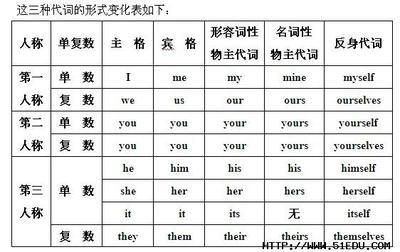 Take any you like. |
both、all 都 | Both (两个)都 All(三个或三个以上)都 ★all、both在句子中的位子:在be动词后面,其他动词前 We both studied in Beijing University. We are all interested in pop music. |
each、every 每一个 | Each(两个中的)每一个 Every(三个或三个以上的)每一个 ★ each、every 在句子中的位子:在be动词后面,其他动词前 |
one 、other anther | one :不定的人或物,复数ones other:单数,必须加the (one…..the other), 复数others,表示其他的人或物 anther:另一个人或物,再一个 ★some…the others |
one … the other one…. 和 the others /the other | ★one ….the other+可数名词:特指两个之中的“一个…..另一个….. Mr. Li has two sons.One is a doctor and the other is an engineer. ★one…. the others /the other+可数名词:特指三个或三个以上的情况“一个…….另一些/另几个…… There are five flowers in the vase. One isyellow, the other four ones are red. |
Some… the others 和 Some…. others | ★Some…the others特定范围,“一些…..另一些” The students are busy with the experiment. Some areoperating the machine, the others are recording theresults. ★Some….others较广范围,“一些……别的一些” Many old people are in the park. Some are walking,others are talking. |
one…. another… the other/the third | ★列举三个以上时,按one….another…the other/thethird的顺序 The woman has three sons. One is in China,another is in America, the other is in France. |
each other和 one anther | ★eachother两者之间“相互….” ★oneanther三者或三者以上之间“相互….” |
no one 、nothing、none | no one指代可数名词,表示人,用来回答who的问题,不可跟of nothing指代不可数名词,表示物,用来回答what的问题,不可跟of none指代可数/不可数名词,表示人或物,用来回答how many/howmuch的问题,可跟of |
 爱华网
爱华网